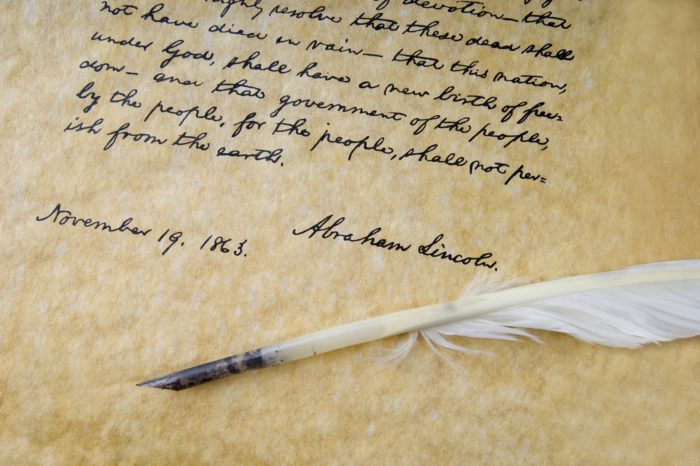The Gettysburg Address at 150: Reflections from Civil War Historian James McPherson
Today, as the nation commemorates one of history’s most famous speeches, Pioneer Institute proudly presents an archived video and transcript of a keynote address by Pulitzer Prize-winning Civil War historian and Princeton University Professor Emeritus James M. McPherson. He spoke at “The Legacy of Lincoln: U.S. History in American Schooling,” a Pioneer forum held earlier this year, marking the 150th anniversary of both the Emancipation Proclamation and the Gettysburg Address.
https://www.youtube.com/watch?v=iQuwJz4nzxY&list=PL0BWHvcPmNxt7vs5f7v9aEksx_6TfmHRr&index=1
[wpdm_package id=390]
In the video, Professor McPherson quotes from the Gettysburg Address, and shares thoughts on its significance:
[quote align=”center” color=”#999999″]”‘Four score and seven years‘ in the past, said Lincoln, ‘our fathers brought forth on this continent a new nation, conceived in liberty. Today, in 1863, our generation faces a great test whether a nation so conceived can survive. In dedicating the cemetery on this battlefield, the living must take inspiration to finish the task that those who lie buried here so nobly advanced by giving their “last full measure of devotion.”
“Life and death in this passage have a paradoxical relationship: men died that the nation might live, yet the old Union also died, and with it would die the institution of slavery. After these deaths, the nation must have a “new birth of freedom” so that government of, by, and for the people that our fathers conceived and brought forth in the past “shall not perish from the earth” but live into the vast future, even unto the next millennium.”[/quote]
The Civil War took the lives of over 600,000 Americans; another 405,000 were wounded. The Battle of Gettysburg was fought in July 1863, and left 50,000 casualties (the largest number of any Civil War battle). It was at the dedication ceremony for the Gettysburg National Cemetery that President Lincoln delivered his famous address, on November 19, 1863.
Sadly, many of our children do not know these historical facts and human realities. That’s because student scores on national testing have seen decades of decline. National Assessment of Educational Progress results show that only 22 percent of US students test proficient in civics, and only 18 percent rate proficient in U.S. history.
In Massachusetts, passing a basic U.S. history MCAS test had long been scheduled to become a high school graduation requirement for the Class of 2012. But in 2009, the state Board of Elementary and Secondary Education abandoned it. As a result, history courses are being replaced with additional courses in tested content areas.
To have an understanding of the importance of these soldiers’ sacrifice, our schoolchildren need strong instruction in US history. Polling data show that Massachusetts parents, teachers, and state lawmakers support restoring the state assessment in US History as a graduation requirement.
Two Pioneer Institute reports, Shortchanging the Future: The Crisis of History and Civics in American Schools, and The Rise and Fall of the Study of American History in Massachusetts, note the general lack of understanding of American history in our society, because of how we teach history in K-12 schools.
With the Commonwealth’s students missing out on studying the Civil War, the time has come to restore our history to its rightful place in Massachusetts schools by reinstating the requirement that students pass a U.S. history MCAS test to graduate from high school.
Pioneer Institute has actively promoted rigorous, content-based academic standards that include U.S. history and civics instruction.
In January 2013, Pioneer hosted an event “The Founders and Slavery: Teaching U.S. History in Schools.” The keynote addresses were delivered by Dr. Howard Dodson, who directs Howard University’s Moorland-Springarn Research Center and Library System, and Dr. Jack Rakove, the William Robertson Coe professor of history and American studies and professor of political science at Stanford University. Professor Rakove won the Pulitzer Prize in History for his book Original Meanings: Politics and Ideas in the Making of the Constitution.
In May 2012, Pioneer hosted an event featuring presidential historians Willard Sterne Randall and Jeff Shesol, on “The Power of the U.S. Supreme Court: A Civics Lesson,” at which national pollster David Paleologos presented public opinion survey results demonstrating deep and wide support among Massachusetts social studies teachers, legislators, and citizens for restoring the passage of an MCAS U.S. history test as a high school graduation requirement.
In 2010, Pioneer held an event on the importance of a U.S. history-rich core knowledge curriculum that featured University of Virginia Professor Emeritus E.D. Hirsch, Jr., and Andrew J. Rotherham, former Clinton administration aide and co-founder and partner at Bellwether Education. (Transcript: The Sacred Fire of Liberty).
Pioneer also co-sponsored a conference in May 2008, “History and Civic Education: The Learning of Liberty for Civic Life,” with the Projects in Civic Engagement at Boston University’s School of Education. The event, featuring Pulitzer Prize-winning and Brown University historian Gordon S. Wood, focused on preparing students with a working knowledge of U.S. History for active citizenship.
“America will never be destroyed from the outside,” Abraham Lincoln said. “If we falter and lose our freedoms, it will be because we destroyed ourselves.”
As we’ve argued in op-eds and commentary, the nation’s ongoing war of neglect of its own history is making President Lincoln’s words sound eerily far-sighted.



